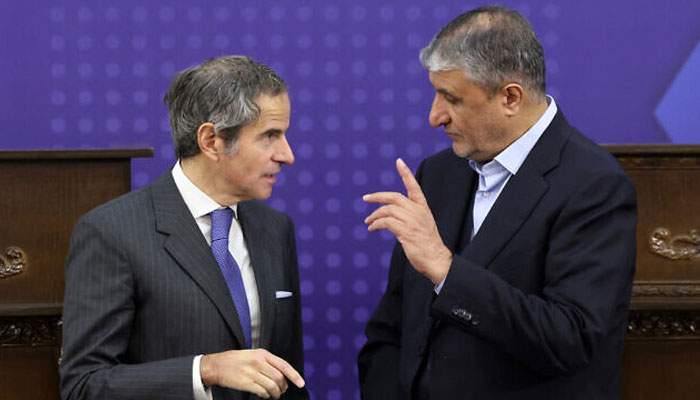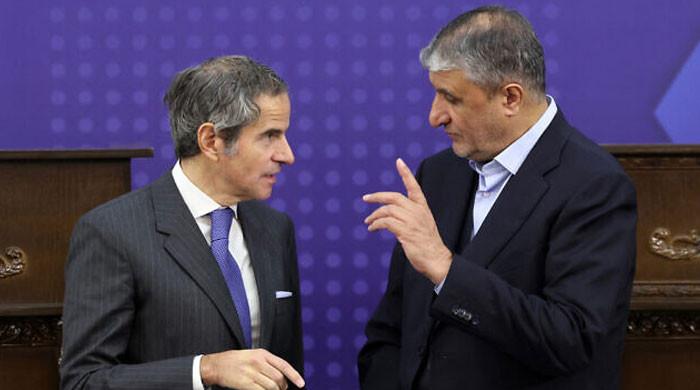
TEHRAN: Iran is scheduled to meet with France, Germany and the United Kingdom on Friday for discussions on its nuclear program.
The meeting comes after the joint decision of the three European countries, along with the United States, to condemn Tehran through the United Nations International Atomic Energy Agency.
Last week’s rebuke prompted a defiant response from Tehran, but its officials have since indicated a willingness to engage with other parties ahead of the return of US President-elect Donald Trump, whose last administration pursued a “maximum pressure” policy against the Islamic Republic.
Iranian diplomat Majid Takht Ravanchi, who serves as political deputy to Foreign Minister Abbas Araqchi, is scheduled to represent Iran in the talks on Friday.
He will meet in advance with Enrique Mora, deputy secretary general of the European Union’s foreign affairs arm, according to IRNA.
Last week, the Board of Governors of the United Nations International Atomic Energy Agency, which includes 35 countries, adopted a resolution condemning Iran for its lack of cooperation on nuclear issues.
The resolution was presented by France, Germany, the United Kingdom and the United States, and Tehran strongly opposed it.
In response, Iran announced the launch of “new advanced centrifuges” designed to increase its stockpile of enriched uranium.
Tehran’s willingness to sit down with the three European countries after a brief period of censure comes just weeks before Trump returns to the White House in January.
During his first term, Trump focused on imposing severe sanctions on Iran after the United States unilaterally withdrew from the landmark 2015 nuclear agreement three years after it was concluded.
This agreement between Tehran and the major powers aims to ease the stifling Western sanctions on Iran in exchange for limiting its nuclear program to prevent it from developing a nuclear weapon.
In response to the US withdrawal, Tehran reduced its commitment to the agreement, and raised uranium enrichment levels to 60 percent – roughly the 90 percent required to make a nuclear bomb.
Tehran has consistently denied any intention to seek nuclear weapons.
For Tehran, the goal of Friday’s talks is to avoid a “double disaster” scenario, where it will face renewed pressure from both Trump and European countries, according to political analyst Mostafa Shirmohammadi.
He noted that Iran’s support among European countries had been eroded by allegations that it offered military assistance to Russia’s invasion of Ukraine.
Iran denied these accusations and hopes to repair its relations with Europe, while maintaining a firm stance.
“Legal Obligations”
The IAEA’s censure resolution urged Iran to “fulfill its legal obligations” under the Nuclear Non-Proliferation Treaty, ratified in 1970, which requires member states to declare and keep its nuclear material under IAEA supervision.
In response, Foreign Minister Araqchi, who played an active role in nuclear negotiations in 2015, said Iran was operating “several thousand advanced centrifuges.”
The head of the Iranian Atomic Energy Organization, Mohammad Islami, announced on Wednesday that they had begun introducing gas into the centrifuges.
Centrifuges work by rapidly spinning uranium gas to increase the ratio of the fissile isotope U-235.
Iran insists on its right to access nuclear energy for peaceful purposes, but according to the International Atomic Energy Agency, it is the only non-nuclear-weapon state that enriches uranium to 60 percent.
Under the 2015 agreement – which expires in October 2025 – Iran’s enrichment was capped at 3.67 percent.
Supreme Leader Ayatollah Ali Khamenei, who has ultimate decision-making authority in Iran, issued a religious fatwa forbidding the use of atomic weapons.
The history of Iran’s nuclear program dates back to the late 1950s, when the United States, which was its ally at the time, signed a civil cooperation agreement with Shah Mohammad Reza Pahlavi.
